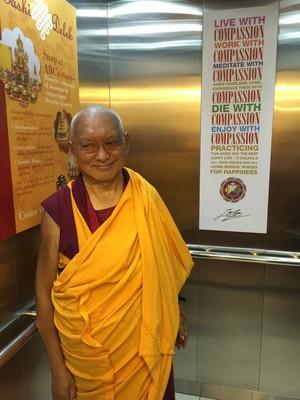Nobody likes a person with a selfish mind, even in the office, because with that attitude their behavior is different. There is no respect when speaking. So many problems arise because the person becomes unkind to others. The result is most people in the office don’t like them. Wherever the person goes, even to different parts of the world, they always find problems with people. They are constantly unhappy because people don’t like them, and then they are always very depressed, very sad and angry because of all those problems.
So, with the self-cherishing thought, we become alone. Nobody loves us, nobody likes us, nobody wants to help us. Nobody invites us to parties; nobody takes us for outings. We might be working in a busy office or living in a family, with many people around, but we are alone. Even though physically there are many people around, we are alone. That is the shortcoming of the self-cherishing thought. People don’t come to see us. They don’t even like to greet us when we are on the road. If they see us coming, they cross to the other side or take another road, until we go away.
The person who is selfless, who has a good heart, who thinks of others, who cares about others, who cherishes others, the compassionate person, the good-hearted person—when that person is with the family everybody is happy; they enjoy that person’s company. Everybody in the office is happy to see them, to have them working there. Inside the house or outside, wherever they go, others enjoy their company; they can feel the compassion or the warm heart of the person.
For example, Lama Yeshe took care of me, not only as guru but as a father for thirty years. Everybody could feel his warm heart and how he respected everybody, how he was humble with everybody. Everybody wanted to meet him. Even outside people who didn’t know him enjoyed seeing him. And another one, of course, is His Holiness the Dalai Lama. Concerning Lama Yeshe, everybody was so happy to be with him, to meet him, to talk to him; they could feel his warm heart.
Even my attendant or secretary, whatever, the key person in the organization, Raja [Roger], when we travel, at the airport, people have no idea who he is. People might not know him at all but they suddenly stop and shake his hand; they want to talk to him. They don’t do that to me! Because they feel my self-cherishing thought, they don’t feel that! With him, this unknown person, people really want to shake his hand and talk to him because they can see his gentleness, they can see his warm heart. From the expression on his face, they can see the soft heart, the gentle mind, how he is good-hearted. Even when we travel, people want to talk to him because they need happiness, they want to enjoy time with him. They feel his sincerity, his soft heart, his gentleness. Through the expression on his face, they know he is a good human being.
I just want to end this now. With a bad attitude we cannot even obtain happiness in this life. This ego, this self-cherishing thought has not only been harming us from beginningless rebirths up to now, it has especially been harming numberless sentient beings, directly and indirectly, from beginningless rebirths up to now, If we don’t do something in this life to eliminate this self-cherishing thought, if we don’t eliminate this enemy, this mara, this devil, the ego, the self-cherishing thought, then it will continuously harm numberless sentient beings directly or indirectly. That is much more terrifying [than just harming us]; that is the most terrifying thing.
Because of the self-cherishing thought, desire and anger arise, and then the many other negative emotions arise, harming other sentient beings in many different ways—killing, stealing and so forth. Because our self-cherishing thought harms numberless sentient beings, this is much more terrifying.
Therefore, we can’t wait even a second without doing something to destroy this self-cherishing thought right now, in this life. We can’t stand it even for a minute, even for a second; we have to eliminate it. Not only for our own happiness, for liberation and enlightenment, but most importantly for the happiness of the numberless sentient beings, for their temporal and ultimate happiness, for their liberation and enlightenment. This can’t wait. We can’t stand having it for even a minute, a second; we need to eliminate it. The shortcomings of self-cherishing are vast, like the limitless sky. That is how the ego is harmful.
Now, the I that self-cherishing cherishes is the truly existent I; it does not cherish the merely labeled I. We don’t think, “I am going to cherish the merely labeled I.” Maybe you do. I have never thought that! So, the I that we cherish is not even there. This is the “emotional I,” according to the psychologists’ term, the ordinary people’s term. It is called the real I in Buddhist philosophical texts describing the truly existent I, the I that exists from its own side or that exists by nature. That is the object to be refuted. It is the I that appears as not merely labeled by mind, which is not there at all.
To cherish something that is not there is even more, how do you say it? [Student: Ironic?] Yes, that’s right. Cherishing something that is not there as the most important thing is unbelievably foolish. Then, besides harming ourselves from life to life, we harm all the sentient beings.





























